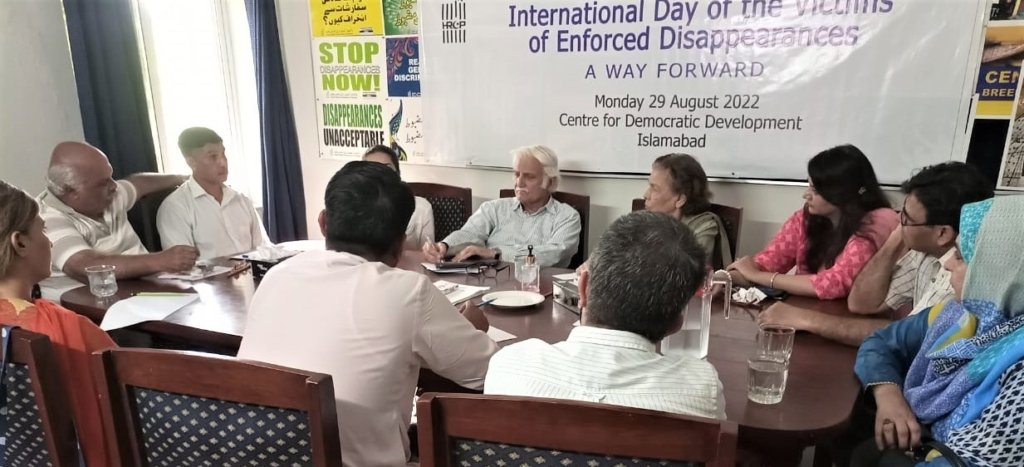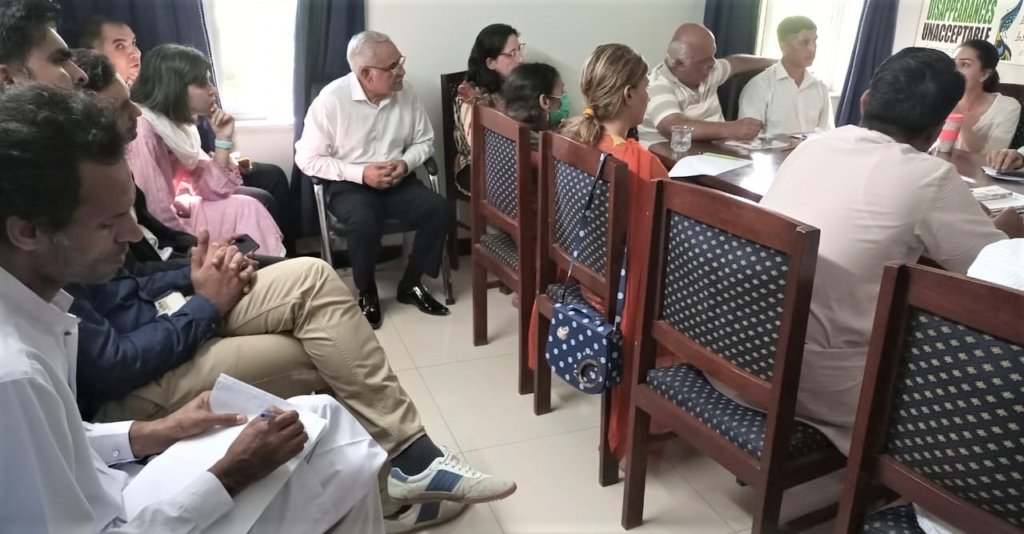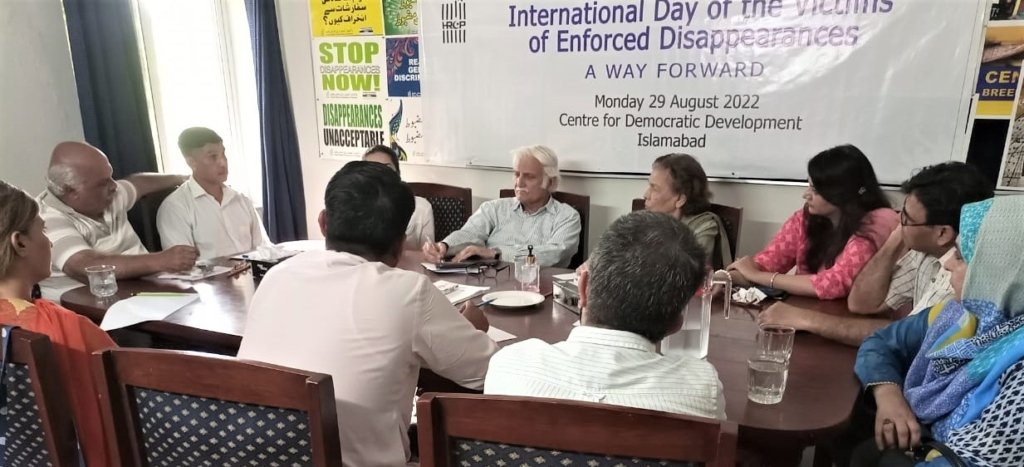Pakistan must ratify the Convention for the Protection of all Persons from Enforced Disappearances; civilian oversight over state agencies
News Desk
Islamabad: Pakistan must affirm its commitment to ending enforced disappearances by ratifying the Convention for the Protection of all Persons from Enforced Disappearance.
A new legal architecture must be put in place to bring state agencies under the ambit of the Constitution by introducing civilian oversight of the state agencies that are regularly implicated in cases of enforced disappearance.
This was the gist of proposals made at a discussion session and a statement issued separately by the Human Rights Commission of Pakistan (HRCP) chairperson Hina Jillani.
The session was organised by the HRCP at its Islamabad office to mark the International Day on Enforced Disappearances on August 30 that was attended by human rights defenders, social activists, writers and journalists.
They demanded the state take action against those security officers who are involved in enforced disappearances.
“A new legal instrument is needed to bring the intelligence apparatus under the ambit of the law and restrain them from acting like a state within the state,” Farhatullah Babar, a former PPP senator said.

The event was attended by HRCP Coordinator for Islamabad region Nasreen Azhar, council member Sadia Bokhari, Amina Masood Janjua and human rights defender Imaan Haazir-Zainab-Mazari.
Senator Babar, who is also an HRCP Council member, in his introductory remarks, called for an end to the involuntary disappearances.
He called for a new instrument of law to redefine the mandate of ISI and to bring the intelligence agencies under the ambit of the constitution to tackle the issue.
It should also provide guarantees that those deprived of liberty are kept at a fully authorized place of detention, provide protection to victims, their families and witnesses and also compensation to them.
The outspoken senator demanded action against those who are involved in enforced disappearances.
He stressed the need for enforcement of laws prohibiting illegal abduction and detention.
“Laws already existed and thousands of FIRs have already been registered. But there is no progress because the agencies allegedly involved in it are themselves beyond the law,” he said.
No matter whatever legislation is introduced if intelligence agencies are not under any law and their mandate is not determined, no purpose will be served by criminalizing disappearances.
In Dec 2015 the Senate Committee of the Whole made nearly half a dozen proposals; the government should have either implemented the recommendations or reverted to the Senate stating reasons why it could not implement them. Picking up the threads from those unanimous recommendations endorsed by the whole Senate would at least open the dialogue, Mr Babar said.
Separately the HRCP chairperson
Pakistan’s premier human rights body has called on the government to ensure that civil society stakeholders — especially from Balochistan, Sindh, South Punjab, and Khyber-Pakhtunkhwa — are consulted while the Senate deliberates on the Criminal Law (Amendment) Bill 2022.
Any ambiguities that might make victims’ families reluctant to report cases must be removed, including the provision that people found guilty of filing ‘fake’ petitions, will be imprisoned for up to five years, suggested the Human Rights Commission of Pakistan (HRCP) chairperson Hina Jillani in a statement.
Additionally, there is a strong case to be made for introducing civilian oversight of the state agencies that are regularly implicated in cases of enforced disappearance. The Islamabad High Court has already stated in June 2022 that the state is obligated to trace missing persons once there is sufficient evidence, prima facie, to establish a case of enforced disappearance. The court has also held that the public functionaries responsible for protecting and tracing missing persons must be held accountable if they have failed in this duty.
This should underscore the gravity of the situation and the painfully slow progress Pakistan has made in redressing what is internationally considered a crime against humanity. Pakistan must thus affirm its commitment to ending enforced disappearances by ratifying the Convention for the Protection of all Persons from Enforced Disappearance.
Most recently, Faheem Baloch, a Karachi-based publisher and writer, was allegedly detained by uniformed police as well as ‘unidentified’ persons, with his family claiming that his whereabouts are still unknown. We demand that he be released immediately and his right to due process protected.
He came down heavily on the Commission on Enforced Disappearances which has failed miserably and suggested that it should be disbanded and a new one set up.
Narrating the ordeal of the victims, he said, during court hearings, it transpired that a number of disappeared persons were locked up in opaque internment centres in ex-tribal areas and in KP under army control. In 2019 the Peshawar High Court declared them illegal and ordered that these be placed under the control of the police.
However, the SC stayed the PHC order. No hearing in the case has been held since December 2019 and enforcedly disappeared persons continue to be lodged in these Guantanamo Bay-like prisons without any access to legal defence counsel or visitation rights for the families.
There have been complaints of custodial deaths and torture in these centres, but these have not been investigated, he alleged, requesting the SC to take up the case on an urgent basis.
The former senator said an inadequate bill was moved in the National Assembly in June 2021 to address the issue, but even that bill seems to have disappeared.
Although it acknowledged the crime of enforced disappearance and defines it as “an unlawful or illegal deprivation of liberty by an agent of the state”, it did not define the mandate of intelligence agencies allegedly behind the crime, which has made it hugely problematic.
He described the setting up of a ministerial subcommittee by the present government on the issue as a step in the right direction. He, however, said it should also visit all provinces and meet the victims’ families who should be compensated.
“We expect the Ministerial Subcommittee to propose comprehensive legislation in consultation with all stakeholders.”
Ratification of the International Convention for Protection against Enforced Disappearances must form part of the new legal architecture.
In the mid-1960s a military dictator made an amendment, 2 (1) (d), in the Army Act to give powers to the army to investigate and try civilians in military courts in some cases. Such a law does not exist even in Indian Occupied Kashmir or Israel, he lamented.
It was under this provision in the Army Act that human rights defender Idris Khattak remained disappeared for over 8 months until, as a result of national and international outcry, his custody was acknowledged by security agencies.
This amendment in the Army Act must also be done away with.
Nasreen Azhar stated that there is credible evidence that state organs are involved in enforced disappearances, a crime which surfaced in the 1990s but became widespread after 9/11 following the so-called war against terrorism.
The people, particularly conscious sections of the society including media, civil society organizations and students must raise their voices against this inhuman practice and stand with victims and their families.
Amina Masood Janjua the head of Defence of Human Rights said that enforced disappearance was a grave crime which must be taken very seriously. The Commission of Inquiry on Enforced Disappearances has also miserably failed to achieve its objective.
She accused the Chairperson of the Commission of harassing and intimidating women who came to him to lodge complaints about their missing family members.
Worse, the authorities have failed to realize the sensitivity of the issue and promptly act against the suspected harasser. Rather they have initiated legal action against those parliamentarians who demanded an independent, transparent investigation into the matter.
Now the only hope lay with the higher courts of the country, particularly the Islamabad High Court whose chief justice seems committed to recovering missing persons and providing justice to their families, Ms Janjua concluded.
Human Rights Advocate Imaan Haazir Mazari briefed the participants about the incidents of enforced disappearances of Baloch students and ongoing efforts for their safe recovery.
She deplored the fact that even adolescents are not being spared, and that on 17 May a seventeen years old student had been picked up from Rawalpindi.
She said that the Ministerial Commission formed in April this year to look into the cases of harassment and disappearances of students has yet to hold even its first meeting. The Commission of Inquiry has proved to be totally ineffective and has done little to recover missing persons and put an end to this cruel practice. She called for the disbandment of the Commission.
Meanwhile, the HRCP chairperson has called on the federal government to ensure that civil society stakeholders — especially from Balochistan, Sindh, South Punjab, and Khyber Pakhtunkhwa — are consulted while the Senate deliberates on the Criminal Law (Amendment) Bill 2022.
Any ambiguities that might make victims’ families reluctant to report cases must be removed, including the provision that people found guilty of filing ‘fake’ petitions, will be imprisoned for up to five years, the statement read.
Additionally, there is a strong case to be made for introducing civilian oversight of the state agencies that are regularly implicated in cases of enforced disappearance.
The Islamabad High Court has already stated in June 2022 that the state is obligated to trace missing persons once there is sufficient evidence, prima facie, to establish a case of enforced disappearance. The court has also held that the public functionaries responsible for protecting and tracing missing persons must be held accountable if they have failed in this duty.
This should underscore the gravity of the situation and the painfully slow progress Pakistan has made in redressing what is internationally considered a crime against humanity.
Most recently, Faheem Baloch, a Karachi-based publisher and writer, was allegedly detained by uniformed police as well as ‘unidentified’ persons, with his family claiming that his whereabouts are still unknown. We demand that he be released immediately and his right to due process protected, the statement concluded.



